Egg Labels, Decoded
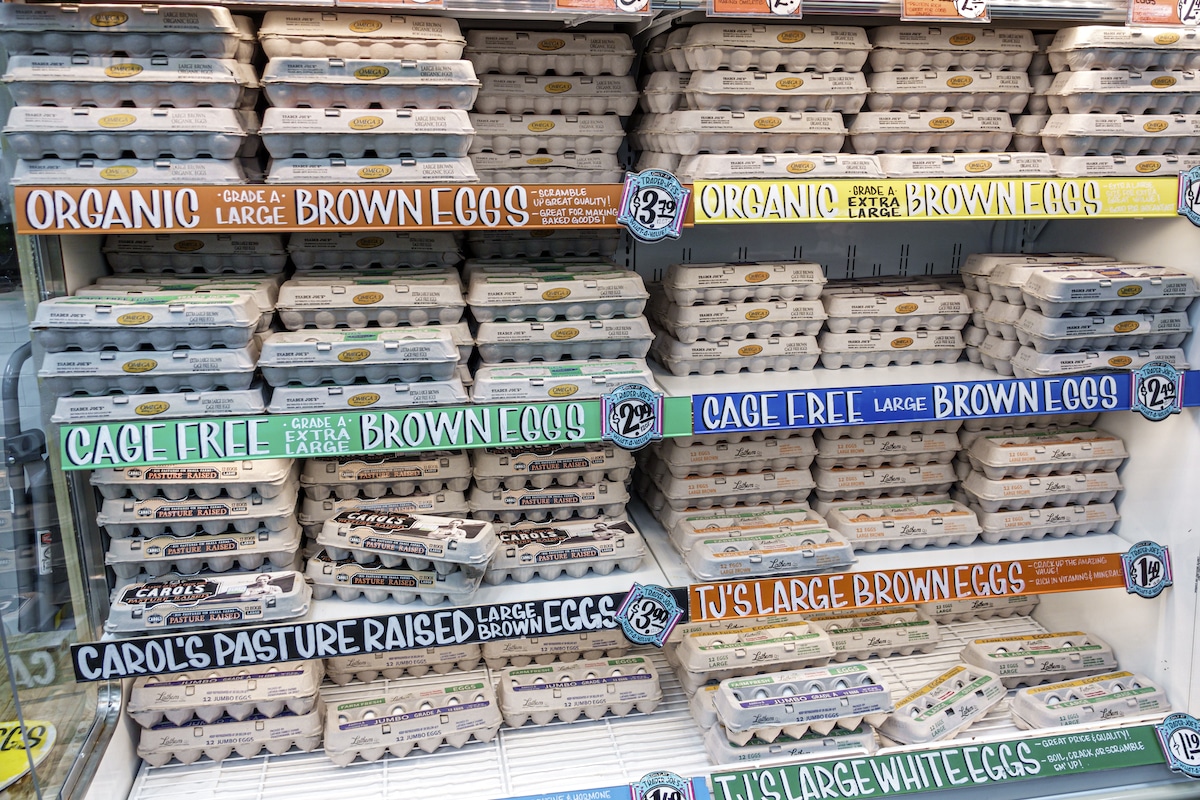
 Why you can trust us
Why you can trust us
Founded in 2005 as an Ohio-based environmental newspaper, EcoWatch is a digital platform dedicated to publishing quality, science-based content on environmental issues, causes, and solutions.
Faced with a wall of egg cartons at the grocery store, all plastered with different labels and phrases, it’s hard to know what to choose. Which is better: cage-free, free range or pasture-raised? What does “farm-fresh” mean? What lies behind the USDA Organic label? Are vegetarian-fed hens healthier and happier?
Without uniform regulation of these terms by the USDA, it’s hard to determine which phrases are legitimate and actually communicate something about the conditions of the farm, and which are merely greenwashing. While nonprofits and third-party organizations provide their own certifications, there is no single label that takes all issues of environmental sustainability, animal welfare and works rights on industrial factory farms — where most meat, dairy products and eggs are produced in the United States — into account. Deciding which labels and certifications to pay attention to requires some insight into the process.
Labels Regulated by the United States Department of Agriculture
USDA Organic
Like other USDA organic-certified products, USDA Organic eggs must meet pretty stringent requirements to earn the label. The Organic certification is primarily about environmental standards — not the welfare of the chickens or workers’ rights, although hens must have “liberal access to the outdoors” year-round and be fed 100% organic feed. They also aren’t fed antibiotics or poultry by-products (as chickens are sometimes given slaughterhouse scraps in their feed).
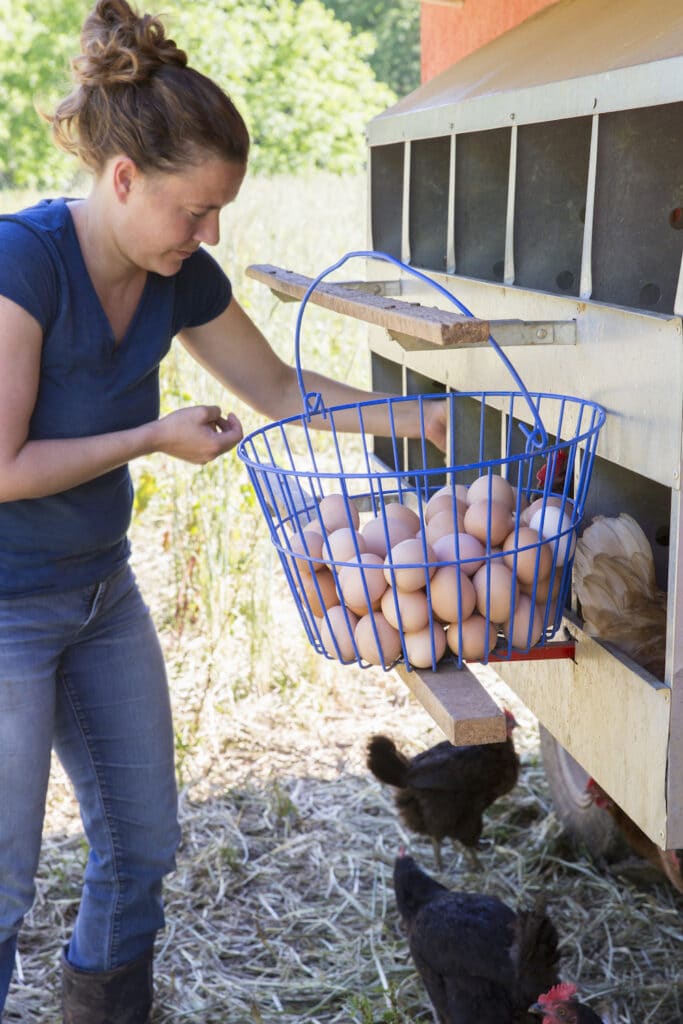
USDA Grades (AA, A, B)
You know those big letters on egg cartons? They’re actually tied to some pretty specific egg qualities evaluated by the USDA through their Agricultural Marketing Service (AMS). It’s not required for producers to have their product graded, so not all eggs on the shelf will have these grades, but those that do have been inspected for certain standards. Producers often enlist AMS to assure customers of the validity of their marketing claims.
Eggs from producers evaluated by the USDA will get a USDA Grade Shield, which also means that the marketing on the package has been verified by the Department (like the terms cage-free, free-range, etc). The grades are based on the quality and appearance of the shell, white (the albumen) and the yolk: AA is the highest grade, with A close behind, and B last, which allows for some imperfections (although no cracks) on the shell.
Labels From Independent Third-Party Organizations
USDA-regulated labels, however, aren’t the only certifications found on egg cartons. Various independent third-party organizations have created their own labels to help customers know that marketing claims made on the product (“non-GMO,” “free-range,” etc.) are legitimate, since they’ve been vetted by this third-party organization. Many of these certifications speak to different issues — animal welfare, biodynamic or regenerative farming practices, etc. — so there’s no single, catch-all label to look for.
The Global Animal Partnership seal is a common one, and reflects animal welfare standards at the production facility. A level 1 seal means that the facility allows cages and crowding, but the higher the level, the higher the quality of life for the chickens. Levels 5 and 5+, for example, require producers to eliminate or reduce painful procedures on the hens. Certified Humane — set by the Humane Farm Animal Care, a nonprofit organization — also has very specific standards for animal care regarding lighting and air conditions, food, cage-free living and access to enrichment activities for the chickens (like dustbathing, perches, etc.).
FoodPrint shares several certifications with verifiable, comprehensive standards that look at environmental sustainability, animal welfare and social responsibility, including Animal Welfare Approved and Certified Regenerative by A Greener World, Demeter Certified Biodynamic, Regenerative Organic Certified and Real Organic Project. View a checklist of the requirements for each label on their website.
Common Phrases and What They Mean
Cage-Free
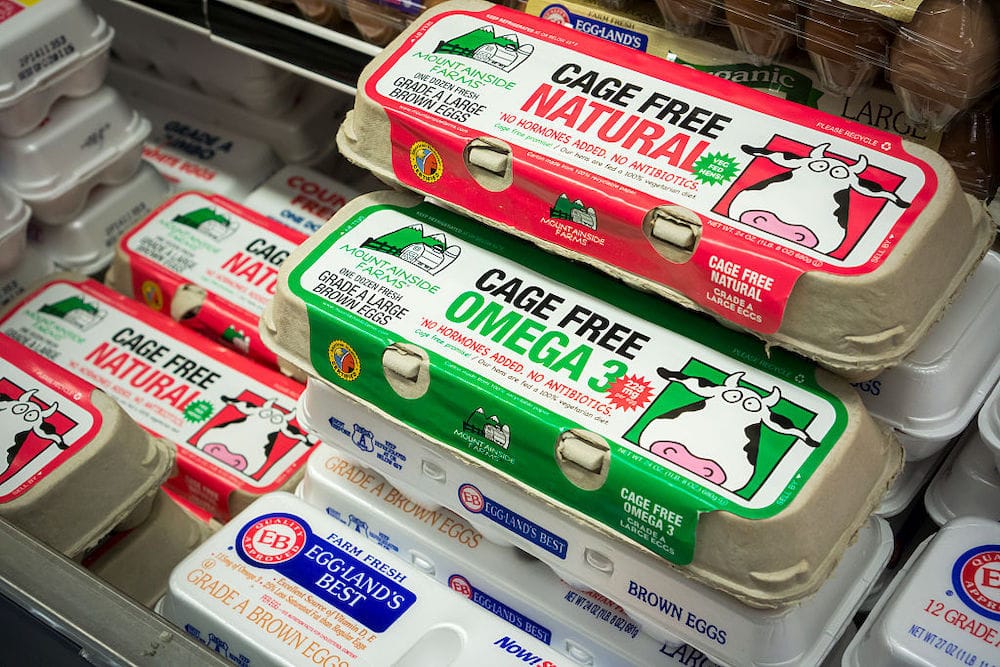
In the United States, 99% of farmed chickens are raised in factory farms, where they are subjected to dangerous, unhealthy and miserable conditions. The vast majority of our egg supply also comes from these facilities, where each cage is smaller than a sheet of printer paper. While cage-free chickens aren’t put under these horrible conditions, it doesn’t necessarily mean they’re wandering around in farm fields.
USDA guidelines say that cage-free hens need to be able to move both vertically and horizontally in their indoor houses, and have access to fresh food and water. The hens must also be able to exhibit “natural behaviors” and have access to enrichments such as scratch areas, nests and perches. It’s important to note that the term “cage-free” is no indication of whether the chickens have access to the outdoors, or how much space the birds have. To know whether these elements are being addressed, the term needs to be accompanied by another third-party certification that evaluates their outdoor access and space requirements, like Animal Welfare Approved, Certified Humane or Global Animal Partnership.
Currently, there is no data on whether free-range or cage-free eggs have a higher nutritional value than those raised in conventional housing.
Free-Range
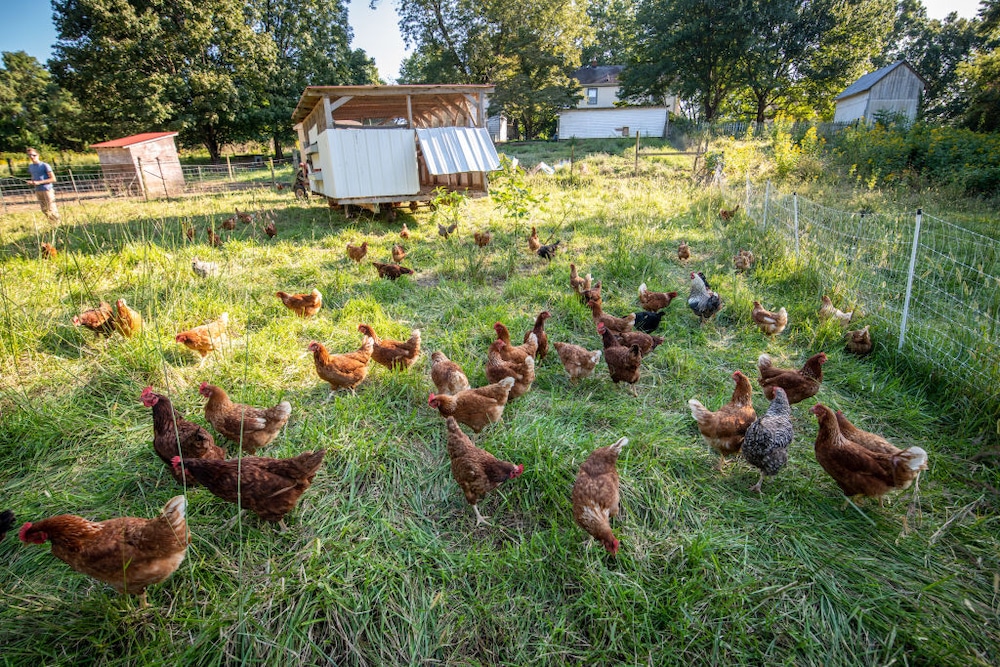
By USDA definition, “free-range” hens mean those that have “unlimited access to food and water” and have the “freedom to roam within the area” and “continuous access to the outdoors during their production cycle.” They must also be fenced and/or covered with netting, and like cage-free eggs, the birds must be allowed to roam both vertically and horizontally in their indoor areas. However, these requirements aren’t super stringent: there’s a lot of flexibility for what these outdoor spaces could be, from a small screened room, to a barn flush with the outdoors. No requirements are set for the size or quality of the space, or the amount of time they need to be outside. Although outdoor access can increase the quality of the hens’ lives, they might still face other types of inhumane treatment.
All-Natural
While the world “natural” is often mistaken to be the same as “organic,” this isn’t true. The USDA defines “natural” eggs as any to which no artificial ingredients were added, and all eggs meet this criteria. Thus, any version of the word “natural” on an egg carton is ultimately nothing more than a marketing tactic.
Farm Fresh
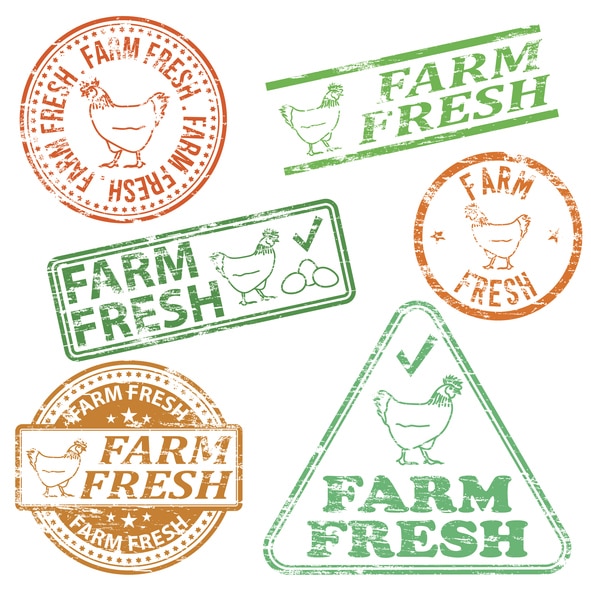
Eyematrix / Getty Images
Despite the photographs of small, idyllic farms and rolling hills that might be on the carton, the term “farm fresh” says nothing about where the eggs inside actually come from. In fact, they could still be coming from a factory-farming operation. The term isn’t connected to any regulations.
Hormone-Free
Products without hormones could also be labeled as rBGH-Free, rBST-Free and No Hormones Added. On dairy products, these labels mean that the cows weren’t given artificial hormones, which help increase milk production — but they are not relevant to eggs. No egg-laying hens in the United States are treated with hormones, so this isn’t an anomaly, or a reason to buy one carton of eggs over another. If you see this on an egg carton, it’s just a marketing tactic
Vegetarian-Fed
While the concept of vegetarian chickens initially sounds more sustainable, the concept is controversial since chickens are natural omnivores that eat grubs, worms and other bugs. Without this source of food, hens often don’t get the necessary amount of methionine (an important amino acid), so some facilities give their birds supplements instead. The chickens are still able to forage for insects on farms where they are allowed to roam outside, but as long as there’s no meat in their provided feed, the “vegetarian-fed” label can still be applied. The label also means they aren’t fed any animal by-products (which can sometimes include ground chicken).
Pasture-Raised
The term itself isn’t defined by the USDA, but certifications from independent groups indicate that such standards are met. Certified Humane eggs labeled as pasture-raised, for example, are laid by chickens raised on land that has at least 108 square feet per bird, and they must be outside year-round with protection available from weather and predators. However, there’s no common government standard for producers, no uniform definition of what a “pasture” is, and no inspections are required to claim the pasture-raised label.
Non-GMO
If stamped with a non-GMO label, the eggs inside come from hens that aren’t fed with genetically modified foods. While all organic products are non-GMO, non-GMO products aren’t necessarily organic, and the label doesn’t speak to whether pesticides or other chemicals were used in the production of the animal feed.
Humane
Phrases like “humane,” “humanely handled” or “humanely raised” are not defined by the USDA, so producers can create their own definitions. Thus, the word itself therefore doesn’t mean anything, unless it’s alongside a seal or certification from a legitimate third party.
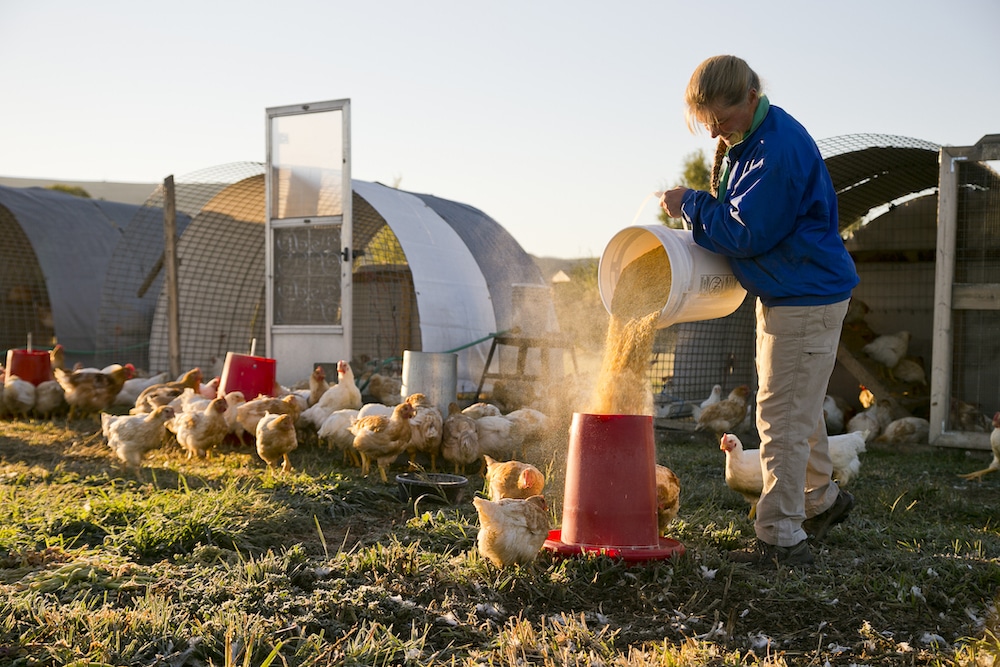
Subscribe to get exclusive updates in our daily newsletter!
By signing up, you agree to the Terms of Use and Privacy Policy & to receive electronic communications from EcoWatch Media Group, which may include marketing promotions, advertisements and sponsored content.

 233k
233k  41k
41k  Subscribe
Subscribe 




